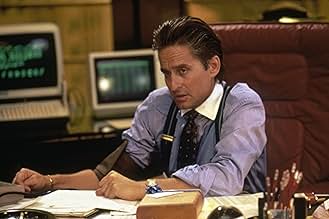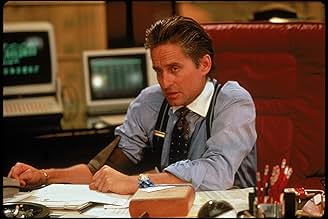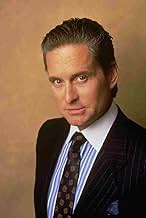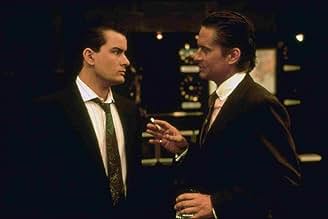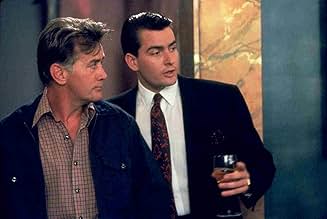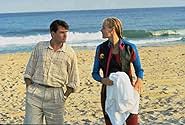Wall Street
- 1987
- Tous publics
- 2h 6min
Un courtier en bourse jeune et impétueux est prêt à tout pour arriver au sommet, même en réalisant des opérations financières à partir d'informations d'initié obtenues illégalement d'un raid... Tout lireUn courtier en bourse jeune et impétueux est prêt à tout pour arriver au sommet, même en réalisant des opérations financières à partir d'informations d'initié obtenues illégalement d'un raider financier impitoyable et cupide qui prend le jeune sous son aile.Un courtier en bourse jeune et impétueux est prêt à tout pour arriver au sommet, même en réalisant des opérations financières à partir d'informations d'initié obtenues illégalement d'un raider financier impitoyable et cupide qui prend le jeune sous son aile.
- Réalisation
- Scénario
- Casting principal
- Récompensé par 1 Oscar
- 9 victoires et 4 nominations au total
- Chuckie
- (as Chuck Pfeifer)
Avis à la une
Many people associate this film with a liberal versus conservative viewpoint on business, a wild-west economy versus a planned economy and relegate this film to 1980's era nostalgia, like the now humorously giant cell phone Gekko is talking on as he walks along the beach. It is said that neither extreme works and that we've gradually settled towards something in the middle. However, the Gekkos of this world are smarter than that, and over the past 20 plus years they have set up an economic system that serves them well. What we now have is a situation where the haves and have-mores have a planned - almost Soviet - system in which the rules stratify them at the top. I cite the changes in bankruptcy law as exhibit A. The members of the labor force that serve them, however, are in the wild-west economy that was once advocated for everyone. Some will rise to the stratified top in this situation, but the vast majority will remain at the bottom shooting it out with each other - for scarce good jobs, good health care, education, etc. Thus, to me, Wall Street is just an opening chapter in the saga of how economic forces and attitudes toward them have changed, not the portrait of a 25 year-old fad that has come and gone.
I love the anxious, terrifyingly rapid advance given to the young Bud Fox from a chance comment in Gekkos daunting office, the instant changes of mood by Micheal swinging from interviewing to lambasting an industry peer on the phone and back to interviewing without a flicker.
Inspirational in the 'no fear' modus operandi of Gordon and then Bud, almost 'you can do anything if you dare' which has always given me a lift when I watch it.
Lush settings, and marvellous counterpointing performance of Terence Stamp, illustrating the 'Gekko' figure scenario in turn to Gordon nas Gordon had to Bud...
Await all Michaels movies with bated breath...Falling down....wonderful...but thats another story
There are two schools of thought when it comes to money. Some economists argue money is an expanding resource, and prosperity a rising tide that lifts all boats. For Gekko, the truth is simpler and more brutal: The rich get richer off the backs of everyone else. "Money itself isn't lost or made, it's simply transferred," he tells his young protégé Bud Fox (Charlie Sheen).
No question writer-director Oliver Stone feels the same way, as he presents this tale of wealth acquisition at its very apex, lower Manhattan circa 1985. In practically every frame showcasing the opulent world Gekko travels can be glimpsed beggars, fishermen, window washers, people who never will have access to the white-collar lifestyles their lowly status perversely enables for others.
For some, this zero-sum take of America clouds their enjoyment of "Wall Street" the movie. It shouldn't. You don't have to buy Shakespeare's version of history in "Richard III" to enjoy the morally bankrupt character at its center, and you don't need to adopt Stone's philosophy to enjoy Gekko.
In fact Stone's attitude about the Street, presented here as a kind of Hogarth caricature, helps make the film so entertaining. He captures the scenes of floor trading and calls and puts in journalistic detail, but leaves room for the human equation. And he has fun, a lot of fun, especially with Gekko, a character who makes you laugh with his pithy comments even as he sets about using poor Fox as a human ashtray.
On an upcoming charity event for the Bronx Zoo: "That's the thing about WASPs. They hate people, but they love animals." On a rival: "If he was in the funeral business, no one would ever die!" To Fox: "You had what it took to get into my office, sport, the question is do you have what it takes to stay."
Fox wants to stay, and allows no SEC regulation to block his wayward path. Stone's father was a stockbroker, and so the director takes special care to show us that all Wall Streeters aren't bad. There's Hal Holbrook, almost too saintly and somewhat detached from day-to-day business of his brokerage house to the point he seems a slumming B-school don. John C. McGinley delivers a standout performance as a vulgar, greedy friend of Fox's who we nevertheless find ourselves sympathetic to, especially as Fox ditches him for Gekko.
But of course it's really Gekko's world, as we watch him at his desk, punching telephone-line buttons and encouraging subordinates to "rip their throats out," checking his blood pressure with one hand while smoking a cigarette in the other. His centerpiece moment, his speech to the stockholders at Teldar Paper, is a compelling soliloquy not because it showcases his brutality but because it allows him a chance to explain his philosophy in a way that sounds logical, even honorable, until you think through the implications. That's Stone's screen writing at its best.
Sheen is also masterful in his role, playing the naive waif who wants to swim with the sharks and thus giving Douglas daylight to run. Too bad there's a tacked-on romance that never really works, in part because the character of Darien Taylor is not well developed, in part because Darryl Hannah hadn't yet met Quentin Tarantino. The ending is a bit too neat, and loses the subtlety that makes the rest of the film so good.
But the heck with subtlety when you have Gordon Gekko. Douglas is the reason for watching "Wall Street," and a terrific one. Just watch the way he looks at Bud, eyebrows raised to hold a pregnant silence, or enjoys the discomfort of his arbitrager-rival Sir Larry (a solid Terence Stamp). Stone knew what he had here, and makes the most of it. As a twisted morality tale, "Wall Street" is a thrilling, scenic ride down a dark and dangerous road.
The film follows a low level day trader (Charlie Sheen) who strives to become a very powerful figure on Wall Street like his idol Gordon Geckko (Michael Douglas). To justify his rise to power, he uses his father (Martin Sheen) knowledge of the flight industry for his own personnel gains. He wants to get his foot into the door of the oily Geckko. Will he sell his soul for a quick buck? How far and fast will this rising star soar? To find these answers check out Wall Street.
This film was made immediately after Platoon. Stone made it clear that he wasn't going to let an Oscar winning malaise effect him. He explores the two fathers theme that he used in Platton and once again makes it work. A highly underrated film that has sadly been neglected by the mainstream audience. What makes it even sadder is the fact that it still applies today.
Highly recommended.
Le saviez-vous
- AnecdotesThe first feature film to show a character using a mobile cellular telephone.
- GaffesAt the beginning of the movie, Bud Fox and Marvin say Gordon Gekko was shorting NASA stock right after the Challenger explosion. The scene is set in 1985, but the Space Shuttle Challenger exploded January 28, 1986.
- Citations
Gordon Gekko: The richest one percent of this country owns half our country's wealth, five trillion dollars. One third of that comes from hard work, two thirds comes from inheritance, interest on interest accumulating to widows and idiot sons and what I do, stock and real estate speculation. It's bullshit. You got ninety percent of the American public out there with little or no net worth. I create nothing. I own. We make the rules, pal. The news, war, peace, famine, upheaval, the price per paper clip. We pick that rabbit out of the hat while everybody sits out there wondering how the hell we did it. Now you're not naive enough to think we're living in a democracy, are you buddy? It's the free market. And you're a part of it. You've got that killer instinct. Stick around pal, I've still got a lot to teach you.
- Crédits fousBuilding illustrations are shown during entire end credits
- Versions alternativesIn the VHS release, instead of the correct 1981-1994 20th Century Fox logo, the 1953-1981 logo is used.
- Bandes originalesFly Me to the Moon
Words and Music by Bart Howard (ASCAP)
Published by The Hampshire House Publishing Corp. (ASCAP)
Performed by Frank Sinatra
Courtesy of Reprise Records
By Arrangement with Warner Special Products
Arrangement by Quincy Jones (uncredited)
Meilleurs choix
Détails
- Date de sortie
- Pays d’origine
- Site officiel
- Langue
- Aussi connu sous le nom de
- El poder y la avaricia
- Lieux de tournage
- 60 W. 75th St, Ville de New York, New York, États-Unis(Bud's first apartment building)
- Sociétés de production
- Voir plus de crédits d'entreprise sur IMDbPro
Box-office
- Budget
- 15 000 000 $US (estimé)
- Montant brut aux États-Unis et au Canada
- 43 848 069 $US
- Week-end de sortie aux États-Unis et au Canada
- 4 104 611 $US
- 13 déc. 1987
- Montant brut mondial
- 43 848 069 $US
- Durée2 heures 6 minutes
- Couleur
- Mixage
- Rapport de forme
- 1.85 : 1
Contribuer à cette page





